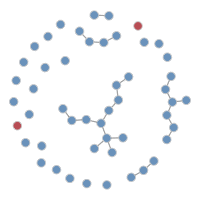7 Introduction
This module covers the theory of statistical models for networks. It begins with simple null hypothesis tests, then moves on to the general statistical modeling class: Exponential-family Random Graph Models (ERGMs). ERGMs are generalized linear models for dependent data that can be used to model both static and temporal (dynamic) networks.
7.1 Module Learning Objectives
- Build intuition for statistical testing in networks, using simple null hypothesis tests
- Develop the general statistical model for networks: ERGMs
- Understand model specification in ERGMs using network statistics, and the difference between dyad independent and dyad dependent terms
- Explore using ERGMs in a lab (via statnetWeb) for network model specification, estimation, and statistical inference
- Preview the network-specific approach to model assessment (goodness of fit)
- Develop the extension to temporal ERGMs (TERGMs), for representing tie formation and dissolution/persistence.
Bottom line, take-away:
- ERGMs are a general, flexible statistical modeling framework for networks
- They provide a principled foundation for model specification, estimation, assessment and simulation, for both static and dynamic networks.
